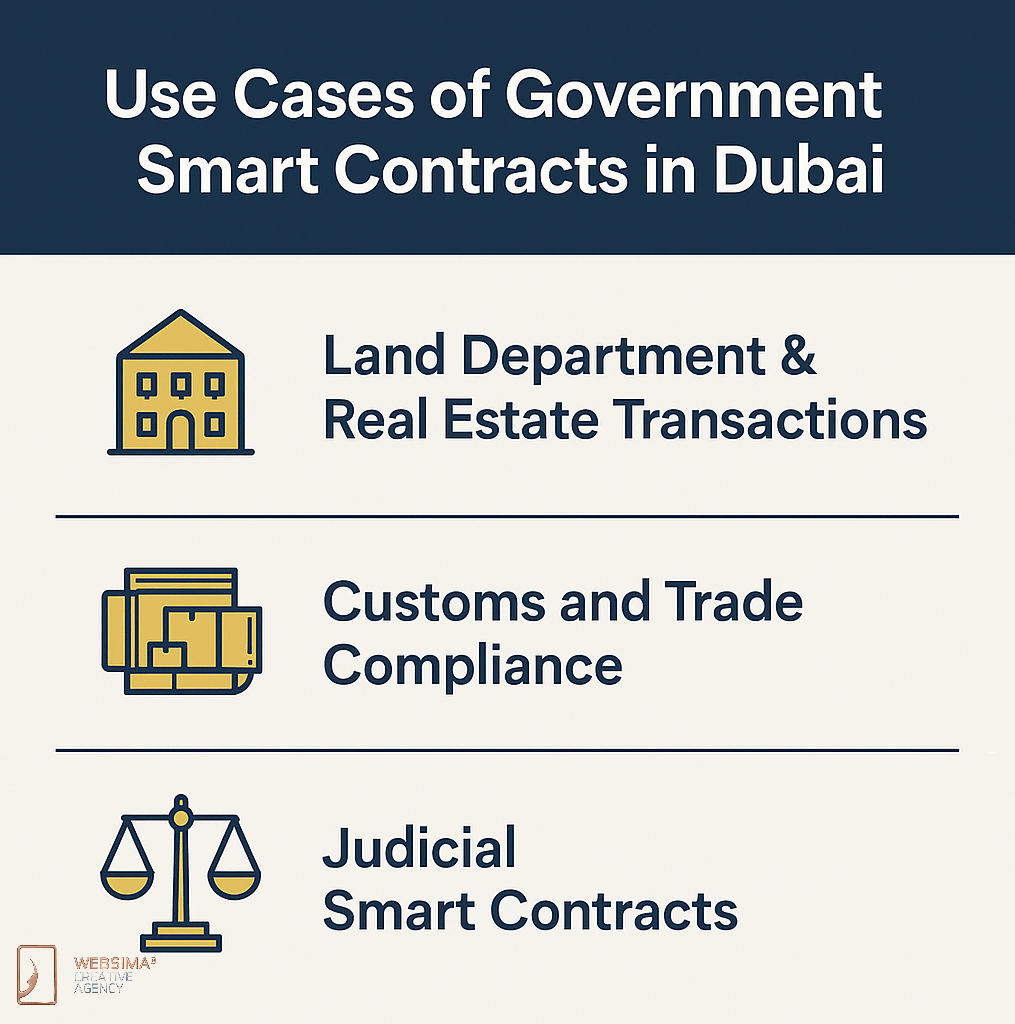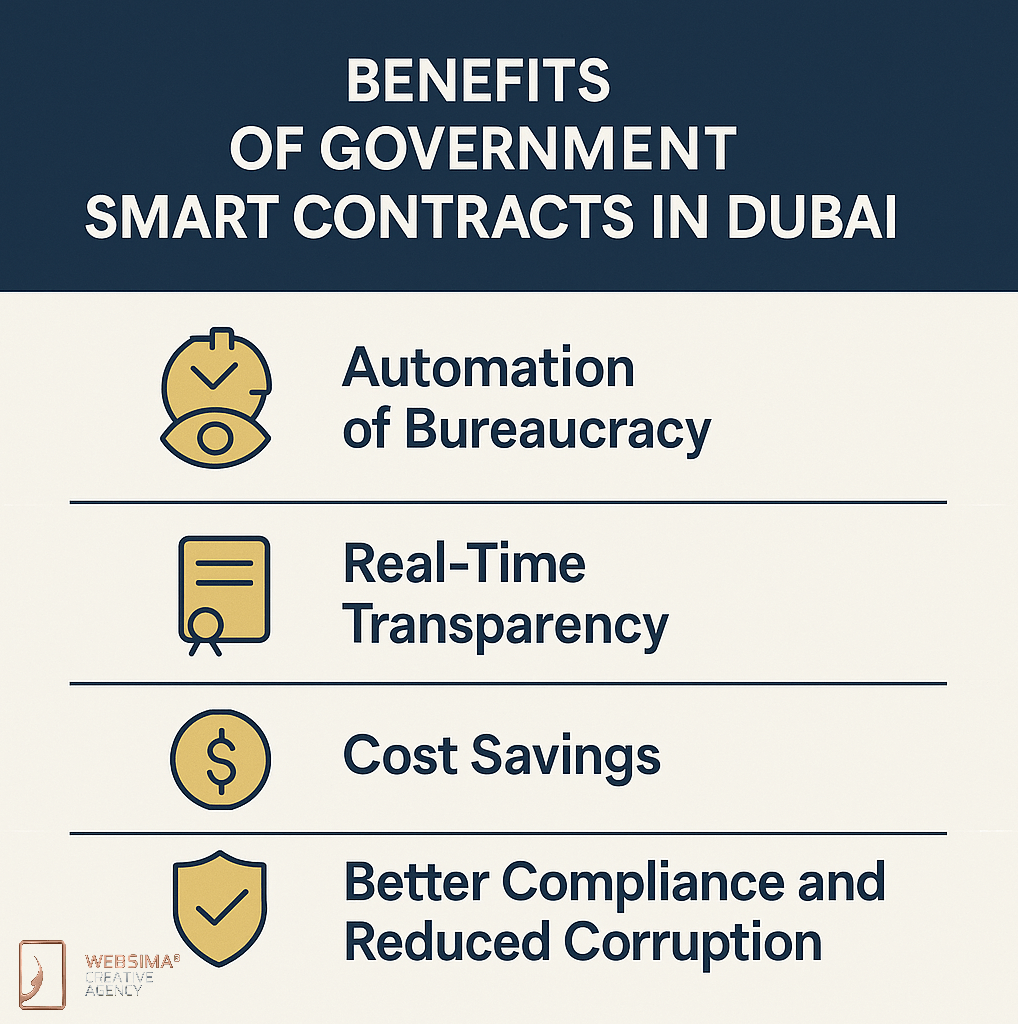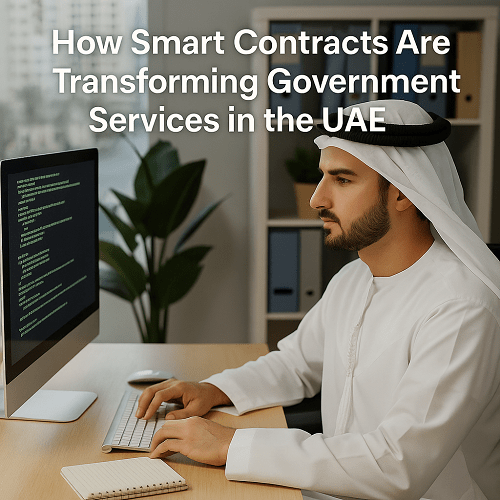Introduction
The United Arab Emirates has long positioned itself as a pioneer in digital governance. From e-residency programs to AI-powered judicial systems, the country continues to push boundaries in how governments interact with citizens. Now, the next evolution is underway: Government smart contracts in Dubai are reshaping how public services are delivered, recorded, and enforced.
By leveraging blockchain’s immutability and automation, smart contracts are creating faster, more transparent, and corruption-resistant interactions between state institutions and residents. This article explores how Dubai is embedding smart contracts into government operations, the benefits and challenges, and what the future holds for decentralized public services in the UAE.
The UAE’s Vision for Blockchain Governance
Today, I chaired the Cabinet meeting at Qasr Al Watan in Abu Dhabi, where we made key decisions to advance legislative processes. We approved the establishment of the Regulatory Intelligence Office within the Cabinet. This office will work on creating a comprehensive legislative… pic.twitter.com/0FbUbxckT8
— HH Sheikh Mohammed (@HHShkMohd) April 14, 2025
Smart Dubai and Emirates Blockchain Strategy 2021
The UAE government launched the Emirates Blockchain Strategy 2021 with the goal of migrating 50% of federal transactions to blockchain. In line with this vision, Dubai’s Smart Dubai Office has been spearheading digital transformation, using smart contracts to automate governmental processes such as:
- Licensing and permit issuance
- Customs and trade documentation
- Visa and residency management
- Real estate title transfers
According to a report by PwC Middle East, blockchain integration in the public sector could save the UAE up to AED 11 billion annually by reducing document processing and fraud. As a result, government smart contracts in Dubai are now seen not just as an innovation, but as a national strategy.
What Are Smart Contracts and How Do They Work?
Defining and Applying Smart Contracts in the Public Sector
Smart contracts are self-executing pieces of code that operate on blockchain networks. Once conditions encoded in the contract are met, actions are automatically triggered — without manual intervention or middlemen.
In a government context, smart contracts are beneficial for:
- Automated licensing approvals
- Conditional disbursement of subsidies
- Decentralized voting systems
- Contractor performance enforcement in public projects
For instance, a municipality in Dubai can deploy a smart contract that only releases funds to a vendor upon verification of project milestones — monitored via IoT devices and blockchain audits.
Real Use Cases of Government Smart Contracts in Dubai

Examples in Action
1. Land Department & Real Estate Transactions
Dubai Land Department (DLD) uses blockchain-based smart contracts to facilitate property title transfers and rental agreements. Smart contracts ensure that once payments are verified, ownership records are updated instantly and securely — reducing fraud and administrative delays.
2. Customs and Trade Compliance
Dubai Customs launched a blockchain initiative to manage cross-border trade documentation. With smart contracts, all participating stakeholders (exporters, customs officers, logistics firms) can validate shipments in real time, reducing inspection time and improving compliance.
3. Judicial Smart Contracts
The Dubai International Financial Centre (DIFC) Courts have initiated research into blockchain-based “Smart Legal Contracts”. These would automatically execute judgments or financial penalties at the time of satisfying the conditions, potentially speeding up civil case resolutions.
For an in-depth view, the World Government Summit regularly publishes case studies highlighting how smart contracts are being trialed across various departments in the UAE.
Benefits of Government Smart Contracts in Dubai

Enhancing Efficiency, Accountability, and Trust
1. Automation of Bureaucracy
Processes that traditionally require paperwork, multiple approvals, or time-consuming audits are now being automated. Government smart contracts in Dubai reduce administrative overhead and error margins.
2. Real-Time Transparency
Blockchain’s immutability ensures that once a transaction occurs, it is publicly verifiable. Citizens and businesses can now audit the progress of their service requests — eliminating concerns around opaque decision-making.
3. Cost Savings
With fewer intermediaries and quicker processing times, government spending optimization becomes achievable. According to Deloitte, blockchain-based smart contracts could reduce administrative costs by up to 30% in public sector agencies.
4. Better Compliance and Reduced Corruption
Smart contracts execute only when conditions are met — reducing discretionary power and enhancing rule-based enforcement. This minimizes fraud, favoritism, and undocumented transactions.
Key Government Agencies Implementing Smart Contracts
Cross-Departmental Adoption in Dubai and Beyond
- Dubai Smart Government (DSG): Piloting digital identity and smart contract-based form submission for citizen services.
- Dubai Electricity and Water Authority (DEWA): Exploring blockchain for metering and automated utility billing.
- Roads and Transport Authority (RTA): Using smart contracts for vehicle licensing, peer-to-peer car sharing, and service records.
These initiatives show that government smart contracts in Dubai are not limited to a single function but form a foundational layer across the city’s digital infrastructure.
Regulatory and Legal Framework
How Dubai Is Adapting Governance for Blockchain
To accommodate these innovations, the UAE has introduced a legal sandbox approach. In 2022, Dubai government established Virtual Assets Regulatory Authority (VARA) to oversee digital asset usage, including smart contracts with financial implications.
Meanwhile, the UAE Ministry of Justice is developing guidelines for interpreting smart contracts under traditional civil and commercial law, ensuring that they hold legal validity in courts.
International law firms such as Clifford Chance have also advised clients operating in Dubai on how smart contracts intersect with existing regulatory codes, particularly in procurement and compliance sectors (Clifford Chance Smart Contracts Insight).
Challenges Facing Government Smart Contract Implementation
Barriers to Full-Scale Adoption
Despite the promise, there are notable hurdles:
- Integration with Legacy Systems: Existing databases and ERP software must be upgraded or made compatible with blockchain systems.
- Technical Complexity: Not all departments have the in-house capability to manage smart contract development or audits.
- Cybersecurity Risks: While blockchain is secure, smart contract bugs can be exploited — requiring continuous auditing.
- Legal Ambiguities: Determining liability in case of contract failure still poses a challenge under current laws.
Dubai is tackling these issues by investing in education, cross-agency blockchain training, and partnerships with specialized firms.
The Future Outlook for Smart Contracts in the UAE Government
Toward Fully Decentralized Governance?
By 2030, experts predict that over 70% of citizen-facing services in Dubai could be automated through smart contracts or AI. This would:
- Free up public resources for strategic planning
- Speed up foreign business onboarding via automated compliance
- Enable decentralized citizen participation in policymaking
Moreover, the convergence of IoT + AI + Blockchain will expand the scope of smart contracts into real-time governance — such as dynamic traffic routing, energy grid optimization, and smart subsidy disbursement.
The UAE is already investing heavily in this ecosystem through its Blockchain 2031 Roadmap, aiming to become the world’s most digitally enabled government.
Final Thoughts
Dubai’s embrace of smart contracts is not just a technological experiment — it’s a full-blown governance revolution. From property registration to public procurement, the integration of blockchain into public systems is redefining efficiency, trust, and citizen engagement.
As implementation scales, the role of government smart contracts in Dubai will only grow, signaling a global benchmark in how governments can serve their people in the Web3 era.
Let Websima Help You Power Blockchain-Driven Public Services
If you represent a government entity, smart city planner, or tech consultancy aiming to support Dubai’s public sector evolution, Websima can help you design and deploy secure, scalable smart contract systems tailored for civic use.
We specialize in:
- Smart contract development and auditing for public-facing systems
- Custom blockchain integration with existing ERP and CRM infrastructure
- Permissioned blockchain networks for inter-agency operations
- Consultation on regulatory compliance with UAE’s legal framework
With deep expertise in Web3, our team ensures that your smart contract solutions meet real-world public needs — securely and efficiently.
Contact Websima to discuss how we can help power the next generation of digital governance.





